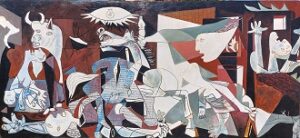
Remaining in peace and love
In the stressful´s situations, uncontrollable and challenging situations arise, the normal thing is for us to get on the “bandwagon” and what is outside passes into our interior, so being “inside” and cultivating a healthy and non-alienating interiority, because it is unaware of the dangers, is fundamental in a crisis.
the normal thing is for us to get on the “bandwagon” and what is outside passes into our interior, so being “inside” and cultivating a healthy and non-alienating interiority, because it is unaware of the dangers, is fundamental in a crisis.
The climate is already in place, it’s not the distant wars but how they splash down on souls in disarray, tormented by “monsters” like Don Quixote’s windmills, which don’t just mean a specific moment in society, but a set of ideas, values and social situations.
It’s also like that in personal life, someone who looks after the sick, drug addicts, the poor and even a wake, needs people who keep calm and point the way, in fact a path, in situations that are not very comfortable.
Querela pacis by Erasmus of Rotterdam, who saw a “religious” war between the kingdoms of his time, The Girl Who Stole Books by Markus Zuzak, which portrays the climate of an era, and now the reissue of Crooked Cross by author Sylvia ‘Sally’ Carson, are examples of people who were “outside” the climate of the time and were able to point out non-warlike paths to their contemporaries.
How these hearts, in the midst of tribulations, manage to remain serene, not cold, but on the contrary very suffering, but they maintain their calm, their humanity and their love for their contemporaries.
Absence in the oriental spirit pointed out by Byung-Chul Han, hope in the Christian spirit and empathy in a teleological sense are means that do not resolve conflicts, because they are the ones that order them to go backwards, but they point to a path in which they safeguard the human.
Picasso’s painting Guérnica (photo) in the midst of the Spanish Civil War manages to look at that despair of an irrational and inhuman battle and give a breath of humanity and awakening.
Hannah Arendt, in a dialogue with St. Augustine, in her doctoral thesis “The Concept of Love in St. Augustine”, makes one of the statements about a passage that is often proclaimed without due depth: “They did not understand […] that ‘Do not do to others what you do not want them to do to you’ was in no way susceptible to different interpretations depending on whether they belonged to such and such a nation. Indeed, if this principle is applied to the love of God, then it is the end of all shameful action; if it is applied to one’s neighbor, it is the end of all crime.” (Arendt, 1973, p. 9) and I would add of all war.
Arendt, H. (1997) O conceito de amor em Santo Agostinho. Lisbon, PT: Instituto Piaget.









